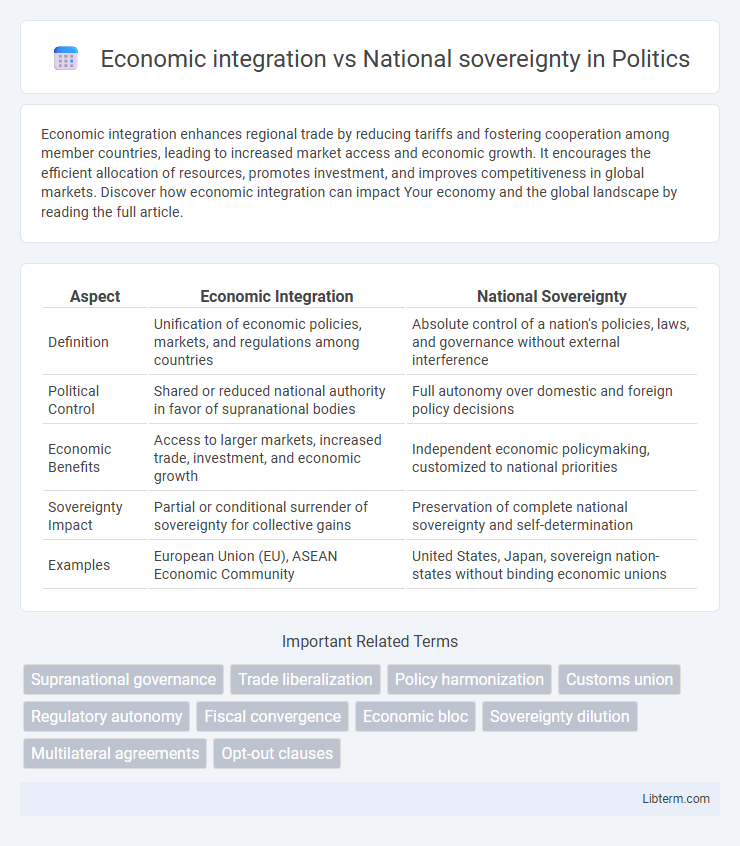Economic integration enhances regional trade by reducing tariffs and fostering cooperation among member countries, leading to increased market access and economic growth. It encourages the efficient allocation of resources, promotes investment, and improves competitiveness in global markets. Discover how economic integration can impact Your economy and the global landscape by reading the full article.
Table of Comparison
| Aspect | Economic Integration | National Sovereignty |
|---|---|---|
| Definition | Unification of economic policies, markets, and regulations among countries | Absolute control of a nation's policies, laws, and governance without external interference |
| Political Control | Shared or reduced national authority in favor of supranational bodies | Full autonomy over domestic and foreign policy decisions |
| Economic Benefits | Access to larger markets, increased trade, investment, and economic growth | Independent economic policymaking, customized to national priorities |
| Sovereignty Impact | Partial or conditional surrender of sovereignty for collective gains | Preservation of complete national sovereignty and self-determination |
| Examples | European Union (EU), ASEAN Economic Community | United States, Japan, sovereign nation-states without binding economic unions |
Understanding Economic Integration: Concepts and Forms
Economic integration involves the process by which countries reduce trade barriers and coordinate economic policies to enhance regional economic cooperation, encompassing forms such as free trade areas, customs unions, common markets, and economic unions. These stages represent progressively deeper levels of integration, from eliminating tariffs among member states to harmonizing monetary and fiscal policies. Understanding these forms highlights the trade-offs between economic benefits from integration and the preservation of national sovereignty in policymaking.
National Sovereignty: Definition and Core Principles
National sovereignty refers to the authority of a state to govern itself without external interference, maintaining supreme control over its territory, laws, and policies. Core principles include territorial integrity, political independence, and the exclusive right to enact and enforce laws within its borders. This sovereignty ensures that states retain decision-making power essential for preserving their cultural identity, economic policies, and security measures amidst global economic integration.
Historical Context: Economic Integration and Sovereignty
Economic integration, such as the formation of the European Union, has historically reshaped national sovereignty by shifting decision-making power from individual states to supranational institutions. Post-World War II efforts to promote peace and economic growth drove nations to pool sovereignty, facilitating free trade and cohesive economic policies. This historical interplay reveals ongoing tensions between maintaining national autonomy and embracing collective economic benefits for regional stability.
Benefits of Economic Integration for Nations
Economic integration enhances trade efficiency by removing tariffs and regulatory barriers, leading to increased market access and investment opportunities for member nations. It fosters economic growth through resource allocation optimization, economies of scale, and technology transfer among integrated countries. Greater economic cooperation stabilizes regions by reducing the risk of conflicts and encouraging policy coordination, which benefits national development and prosperity.
Risks and Challenges to National Sovereignty
Economic integration often requires countries to align policies, regulations, and standards, which can limit their autonomous decision-making and policy flexibility. National sovereignty faces risks such as reduced control over monetary and fiscal policies, increased dependence on supranational institutions, and potential erosion of cultural and political identities. These challenges complicate the balance between benefiting from economic cooperation and maintaining independent governance.
Case Studies: EU and Brexit
Economic integration in the European Union has promoted seamless trade, regulatory alignment, and collective decision-making among member states, enhancing overall economic stability and growth. The Brexit case highlights the tension between economic benefits of integration and the desire to preserve national sovereignty, as the United Kingdom prioritized control over immigration, laws, and borders over continued EU membership. This dynamic illustrates the complex balance countries face between deepening economic ties and maintaining political autonomy.
Globalization’s Role in Economic Integration
Globalization accelerates economic integration by facilitating cross-border trade, investment, and technology exchange, reducing barriers among nations. This interconnectedness can challenge national sovereignty as countries adapt policies to comply with international agreements and multinational corporations' influence. Economic integration driven by globalization fosters regional blocs such as the European Union, where shared regulations and common markets require some sovereignty compromises for collective economic benefits.
Policy Dilemmas: Balancing Integration and Sovereignty
Economic integration promotes shared markets and regulatory frameworks to enhance trade and investment, but it often requires ceding some control over national policy decisions. National sovereignty emphasizes autonomous governance and the ability to tailor policies to domestic priorities, creating tension with supranational rules imposed by integration agreements. Policymakers face dilemmas in balancing the economic benefits of integration with the political imperative to maintain sovereignty and respond to domestic constituencies.
Public Opinion and Political Responses
Public opinion regarding economic integration often reflects concerns about the erosion of national sovereignty, with many citizens fearing loss of control over domestic policies and economic decisions. Political responses vary, ranging from supportive governments advocating further integration to safeguard economic growth, to nationalist parties emphasizing protection of national sovereignty and local industries. Polls in the European Union and other integrated regions reveal fluctuating support influenced by economic performance, migration issues, and perceived effectiveness of supranational institutions.
The Future of Economic Integration and Sovereignty
The future of economic integration involves balancing the deepening of cross-border trade agreements and institutional cooperation with the preservation of national sovereignty, as countries navigate complexities of global governance and domestic policy autonomy. Advanced economic blocs such as the European Union exemplify efforts to harmonize regulations and monetary policies while facing challenges related to member states' control over fiscal decisions and cultural identity. Emerging trends suggest a move toward flexible integration models that accommodate both supranational benefits and respect for sovereign prerogatives, ensuring economic growth without compromising national decision-making authority.
Economic integration Infographic

 libterm.com
libterm.com